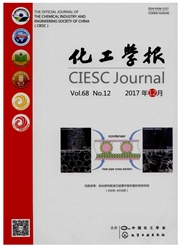

 中文摘要:
中文摘要:
通过改变无机盐的种类,研究无机盐及其混合盐对十二烷基苯磺酸钠(SDBS)/正丁醇/正辛烷/水微乳液体系的影响。微乳体系随着各种盐类浓度的增加,均发生 WinsorⅠ Winsor Ⅲ Winsor Ⅱ的相变,但对不同的无机盐其最佳盐度不同。通过对6组混合无机盐体系的研究,表明混合无机盐的效率参数与混合盐组成之间存在线性关系,可以用单一无机盐的效率参数预测出混合盐的情况。以效率参数为桥梁推导出了单一无机盐与混合无机盐之间最佳盐度的关系式,可用于预测混合盐效应,发现预测结果与实验结果吻合良好。
 英文摘要:
英文摘要:
The influence of inorganic salts on sodium dodecyl benzene sulfonate (SDBS)/butanol/octane/water microemulsion system was investigated by changing the type of salts. Increasing cationic charge concentration of various salts in an anionic surfactant microemulsion system promoted changes in the microemulsion phase behavior from lower phase (WinsorⅠ) microemulsion through middle phase (WinsorⅢ) toward upper phase (WinsorⅡ) microemulsion. While for different inorganic salts, optimum salinities were different. Six groups of salt mixture systems were investigated. There was a linear relationship between efficiency parameter of salt mixtures and their composition, in other words, the influence of salt mixtures could be predicted by studying efficiency parameter of single inorganic salts. By using efficiency parameter as the medium, the relationship between optimum salinity of single salts and their mixtures was deduced, and could be used to predict the influence of salt mixtures. The prediction results coincided well with the experimental results.
 同期刊论文项目
同期刊论文项目
 同项目期刊论文
同项目期刊论文
 期刊信息
期刊信息
